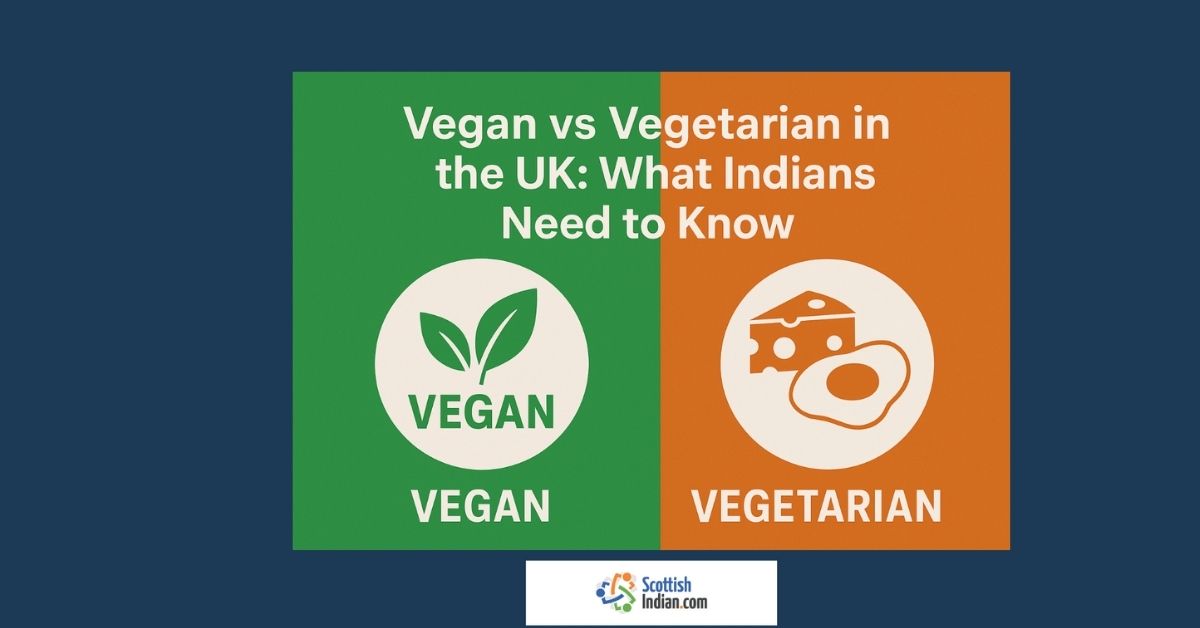If you’re Indian and identify as “veg,” moving to the UK can be a bit of a dietary wake-up call. The terms “vegetarian” and “vegan” are used differently here than they are in many Indian households, and assuming they mean the same could lead to some unexpected ingredients in your meal.
Whether you’re studying, working, or travelling in the UK, this guide will help you navigate menus, food labels, and grocery aisles with confidence.
Wait… What Counts as “Vegetarian” in the UK?
In India, most vegetarians avoid meat, fish, eggs, and often garlic/onion (especially in Jain or religious households). But in the UK:
✅ UK “Vegetarian” = No meat or fish, but mostly will include eggs and dairy.
🥚 Eggs (often from hens) are commonly included in vegetarian dishes.
🧀 Cheese may contain rennet, an enzyme traditionally derived from animal stomachs.
If you avoid eggs or animal enzymes, UK vegetarian labels may not fully meet your expectations.
So, What Is “Vegan” Then?
The term “vegan” in the UK is stricter and probably closer to what many Indian vegetarians actually follow.
✅ UK “Vegan” = No meat, fish, dairy, eggs, honey, or animal by-products.
✅ Also excludes leather, gelatin, and animal-tested products.
So if you’re a pure vegetarian (no eggs or rennet), choosing vegan options is often a safer bet, especially when eating packaged foods or dining out.
How to Read UK Food Labels (Must-Know for Veg/Jain)
Here’s a quick guide to spotting hidden animal products in your supermarket buys:
✅ Look for:
- Green “Ve” or “Vegan Society” logo = 100% plant-based
- Green “V” or “Vegetarian” label = no meat/fish, but check for eggs/milk
- Ingredients like milk, egg, honey will be bolded under UK allergen laws
❌ Watch out for:
- Rennet in cheese (look for “vegetarian cheese” or “microbial rennet”)
- Gelatin in yoghurts, desserts, or sweets (not veg!)
- Whey or casein (milk proteins in processed foods)
- Albumin = egg white
- E-numbers like E120 (cochineal – from insects)
🧘 Jain Tip: Always scan the full ingredient list. UK packaging rarely flags garlic/onion separately.
Read about UK Food Allergen Labelling (Gov.UK)
Restaurant Tips: Eating Out Without Confusion
Dining out in the UK? Here’s how to make sure your meal meets your standards:
✅ Do this:
- Ask: “Is this dish free from eggs, gelatin, or rennet?”
- Say: “I’m vegan”, if you don’t eat eggs or dairy. It’s better understood than “pure vegetarian.”
- Use the HappyCow app to find veg-friendly restaurants
📋 Watch for:
- “Vegetarian breakfast” may include eggs and cheese with rennet
- Indian restaurants in the UK sometimes use cream or ghee—ask before ordering
- Salads can contain egg-based dressings (mayo, Caesar)
Jain-Friendly Phrases You Can Use
If you follow a Jain or sattvic diet, you can say:
“I’m Vegan and also avoid onions and garlic.”
“Does this have any root vegetables like onions, garlic or potatoes?”
Most UK servers will do their best to help if you’re clear and polite.
- Tesco & Sainsbury’s: Excellent vegan ranges
- ASDA: Budget-friendly meat-free lines
- M&S: Great quality vegetarian meals (watch for egg!)
- Whole Foods / Planet Organic: High-end, Jain-friendly options
- Indian/Asian stores: Best for familiar dals, spices, and ghee alternatives(Checkout Spicesupermarket for delivery options in Edinburgh)
If you’re Indian and used to calling yourself “veg”, that might not mean the same thing in the UK. For eggless, rennet-free, and dairy-free eating, your best bet is often to ask for vegan options or read food labels carefully.
Being aware of the local definitions will help you enjoy more meals with fewer surprises, especially if you follow dietary principles for cultural, ethical, or religious reasons.
Check out our full India-to-UK Survival Guide or browse Restaurants blog.






